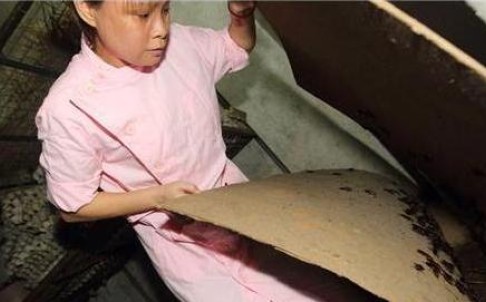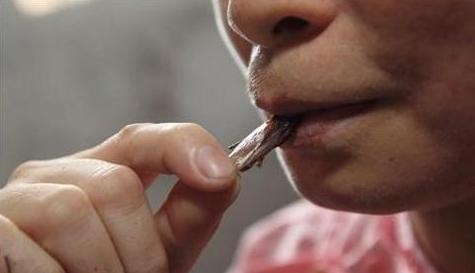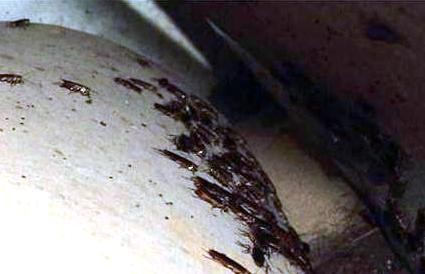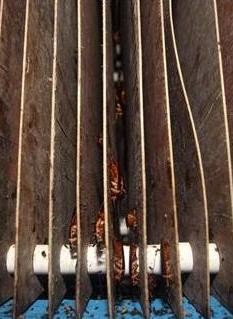'They're like my children': The woman who keeps 100,000 cockroaches in her home
Woman devotes entire rural home to sweets-loving roach species that she sells to a pharmaceutical factory
PUBLISHED : Thursday, 12 June, 2014, 3:09pm
UPDATED : Thursday, 12 June, 2014, 4:31pm
Keira Lu Huang [email protected]

Yuan Meixia says she was inspired to breed the Palmetto bugs after seeing a show about the insect last year. Photo: Nandu.com
While others would do everything in their power to keep cockroaches out of the house, one Chinese woman has welcomed the creepy critters – all 100,000 of them.
Yuan Meixia, a 37-year-old pharmacy employee in Fujian province, uses her countryside home next to the woods as a breeding ground for the roaches, which she then sells to a pharmaceutical company that uses it in certain medicines.
The insects will eventually be dried and sold to a factory in faraway Anhui province, but during their short lives with Yuan, she treats them “like her children”.
”These are all my children, my babies,” she says to a Southern Metropolis News reporter on a tour of the facility in Linbian village. Yuan resides at another house in Siqian county, but visits the breeding house every day.
Inside the house, there are zippered silk nets instead of doors and every crevice or hole is sealed shut with cement to keep the cockroaches in.

Although she calls them her 'babies' or 'children', the insects are killed and dried before being sold to a factory. Photo: Nandu.com
In hot weather, Yuan cools down the house by sprinkling water on the walls. In the cold, she has a gas-fired stove to keep the insects warm.
Yuan, now a local celebrity for her offbeat side project, raises mainly Palmetto bugs, a large and winged cockroach species common in the United States. They thrive in damp conditions and have a preference for sweets and starch.
On a CCTV show last year, “I saw people raise this kind of cockroach in Anhui. They said it can be food and also can be medicine,” Yuan said. “So I took tens of thousands of yuan to learn [breeding them] for a week and spent more than 10,000 yuan [HK$12,600] to buy 20kg of live cockroaches.”
Yuan believes components in the insects can fight cancer. “Dried Palmetto bugs can act as anti-cancer drugs,” she says, without citing specific studies.
Researchers at the Second Affiliated Hospital of Anhui Medical University said in a recent report that components in the insect have liver-boosting capabilities when consumed by mice with liver damage.
“The Palmetto bug and its extracts can protect liver functions when [the natural protein Concanavalin A] caused acute immunity hepatic injury among mice,” they wrote.

The insects have a run of her house in a rural village in Fujian, where they are fed fruit and bran every day and are ensured comfortable conditions in hot and cold weather. Photo: Nandu.com
Yuan places honeydews, apples and rice bran on shelves at each end of the room, where the insects swarm and feast. On the living room table is a bag of glucose for the baby cockroaches, or nymphs, which resemble little red beans.
”Like children, they need sufficient nutrition,” said Yuan with a smile, adding that she keeps the adults separate from the nymphs. She feeds them at 6pm every day.
”They are most active at night, mating and hunting for food,” said Yuan. “They mate with each other after eating. The mating process lasts for two hours, and then spawning [happens]. Every spawn hatches dozens of baby cockroaches.”
In the warm conditions of southern China’s regions, it takes about a month for the babies to hatch. At any given time, she has around 100,000 cockroaches and sells the matured ones to the factory every two months.

A study by a local Anhui hospital indicated the Palmetto bug extracts have liver-boosting components. Photo: Nandu.com
Yuan drowns them in vats of water then dries them under the sun before placing them in plastic bags and selling them to the factory more than 900km away in Anhui. A doctor of traditional Chinese medicine says Palmetto bugs are not officially accepted in TCM but are used in many folk recipes.
”Those dried ones can be sold at 300 yuan to 400 yuan per jin [about 0.5kg]. I harvest every two months and dry 10kg to 20kg every time,” Yuan told the newspaper.
He Chuangyao, director of an animal-welfare institute in the city said Palmetto bugs have medical value to a certain extent, but their breeding should be carefully monitored.
”The mass rearing techniques are mature, but not many locals are currently breeding them,” He said. “Owners should prevent them from running out, spreading viruses and damaging the ecosystem.”
